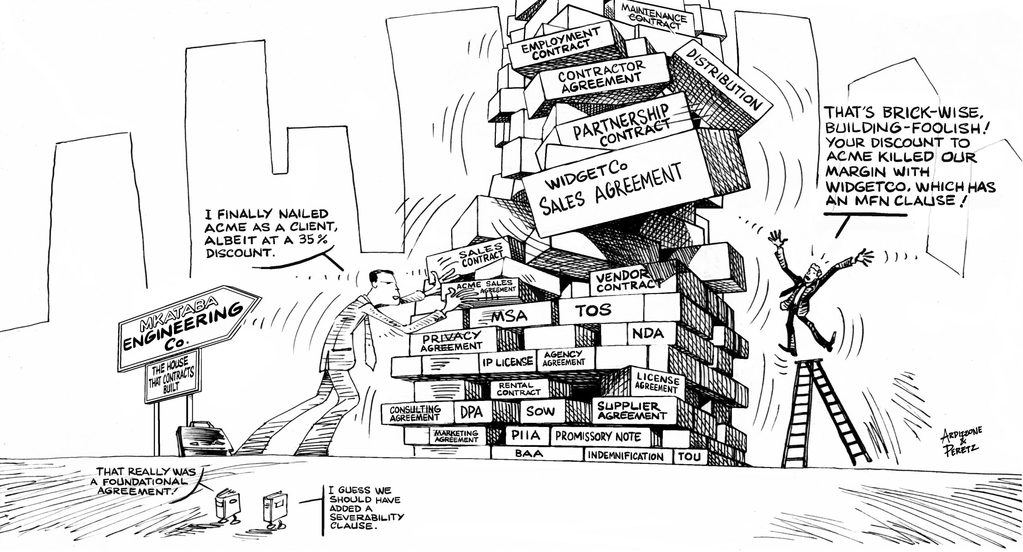- Home »
- Business Bankruptcy
Business Bankruptcy
What Happens When Your Consignee Becomes Distressed and What You Can Do I was speaking with a client yesterday about consignment arrangements. What we discussed should be of interest to any company that sells goods using a consignment arrangement, and I thought I would share. What is a Consignment Arrangement? In a consignment arrangement, the consignor, as owner of the goods, delivers them to a consignee. The consignee, in turn, will try to sell those goods to customers. Be Careful Not to Mischaracterize the Proceeds You Expect from a Consignment […]
The Overlooked (Giant) Asset Class: Executory Contracts In today’s world, one of the most important sources of assets and liabilities for a debtor is its executory contracts. Companies that were once heavy with assets and employees now have a much lighter balance sheet accompanied by many more business agreements enabling (or causing) them to utilize certain assets and services, exercise particular rights and options, and fulfill certain requirements. Financial engineering and more specialized capital markets have turned monolithic companies into asset-light entities reliant on leased space, equipment, and even leased […]
Facing Personal Liability for Business Debts? Who Ya’ Gonna Call?1 People who are not bankruptcy experts but who know something about the subject tend to put all bankruptcy attorneys into one of two buckets: (a) attorneys who help people file bankruptcy; and (b) attorneys who help businesses file bankruptcy. This distinction is mostly correct. Generally speaking, there are two types of people who file bankruptcy: (a) people who incurred debt for personal or household purposes, which are “most people;” and (b) people whose debt derives from some form of business […]
The Battle Over Post-Petition Interest for Oversecured Creditors In bankruptcy, an oversecured creditor (in which the value of its collateral is higher than its claim) is first in line to be paid. Unfortunately, oversecured creditors are also entitled to post-petition interest (interest that accrues or would accrue after the start of bankruptcy proceedings, regardless of whether or not it is allowed in the proceeding). As a debtor who successfully increases the value of the asset/collateral—how do you alleviate an increased claim and maintain liquidity? And what say does the secured […]
Examining the TOUSA Case Ruling on Fraudulent Transfers One of the most powerful tools in the Bankruptcy Code available to bankruptcy trustees (or other estate representatives) to maximize the recovery of creditors is the power to avoid and recover fraudulent transfers of a debtor’s property. These include transfers that are made, or obligations that are incurred, by a debtor: “With the actual intent to hinder, delay or defraud creditors (§ 548(a)(1)(A)); or Constructively fraudulent transfers, i.e., transfers made or obligations incurred for which the debtor receives less than reasonably equivalent […]

“Bankruptcy filings are mounting. And that’s just the tip of the iceberg” – – – A Dissection & Analysis
[Editor’s Note: This article was originally published on LinkedIn on September 20, 2020.] There has been a significant uptick in the number of articles appearing in mainstream media (e.g. newspapers) about the wave of bankruptcies that has already started to appear. One article (linked here), authored by Matt Egan for CNN Business and published about a week ago, caught my particular attention. It is well-written but there were a few things about it that were wrong or, at least, not entirely right. And, so here I am with my thoughts… In […]
How Unique Issues in Healthcare Restructuring Set It Apart from Corporate Restructuring Over the past decade, arguably no industry experienced such dramatic regulatory change or consistent legislative uncertainty as healthcare. Today, continued efforts to repeal, defund, replace, or amend the Affordable Care Act—coupled with rising pharmaceutical costs, increased competition, massive capital investment expenses, etc.—virtually assure a challenging economic environment for healthcare companies for years to come. However, given the stakes involved—and the unfortunate fact that healthcare restructuring provides little time for “on the job training”—practitioners must enter such engagements […]

The Northwest Company LLC – Court Rejects Debtors’ Choice of Successful Bidder, Names Formerly Back-Up Bidder Ashford as Auction Winner
August 25, 2020 – In an unusual twist to an unusual asset sale process, the Court hearing the Northwest Company cases approved the $31.46mn sale of the Debtors’ assets to Ashford Textiles, LLC and Ashford Partners, LLC (together, “Ashford” or “Purchaser”) [Docket No. 301]. The asset purchase agreement (the “APA”) governing terms of the sale is attached to the order as Exhibit 1. On August 7th, the Debtors named Ashford as the back-up bidder, with Cathay Home, Inc. (“Cathay”) named as the successful bidder, notwithstanding that the Cathay bid was […]
Potential Outcomes of Intercreditor Deeds Secured creditors often seek agreement among themselves in order to limit intercreditor conflict and expedite fulfillment of their respective claims against a borrower in a Chapter 11 case. One might call it a “strength through peace” approach. However, in Chapter 11 cases, some courts have ignored intercreditor agreements in cramdown situations, refused to enforce certain terms as contrary to public policy, and have construed a given intercreditor agreement term as not covering the controversy at issue. We note that the likely fate of an […]

Force Majeure, MAC Clauses & COVID-19: A Court Speaks to Every Commercial Tenant in the United States
Why You Should Include a Force Majeure Clause in Lease Agreements The Northern District of Illinois delivered a victory last month for a tenant who could not operate its leased space as contemplated at the time it entered into the lease (and as it had been operating up until COVID-19), because continuing to operate normally would have violated an order issued by the Governor of the State of Illinois. The case in which this ruling was issued is In re Hitz Restaurant Group, 20 B 05012 (June 20, […]







